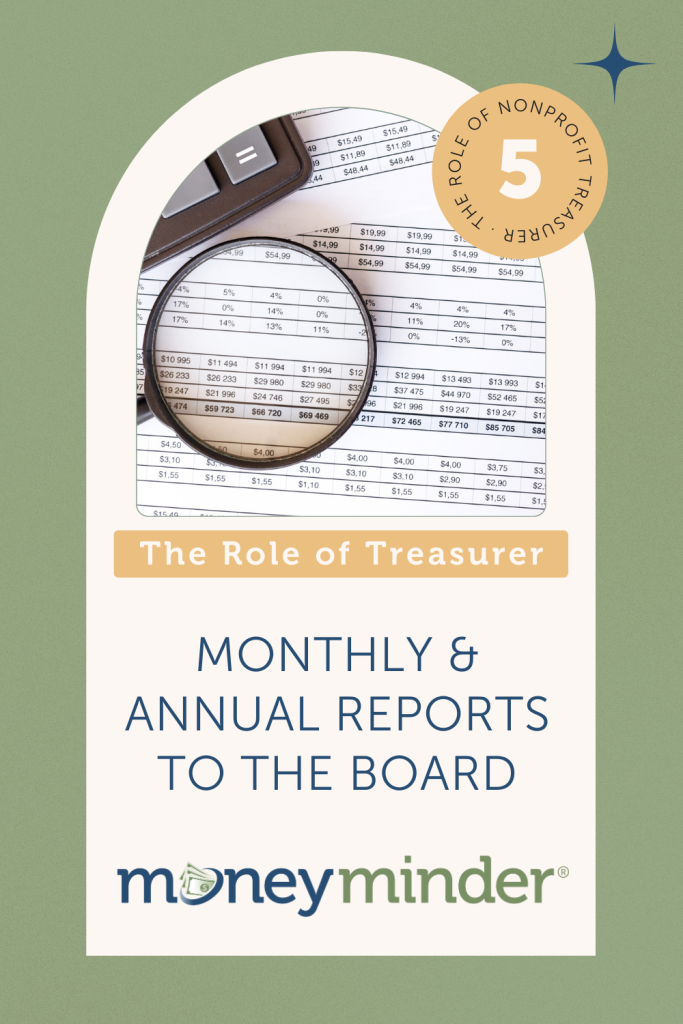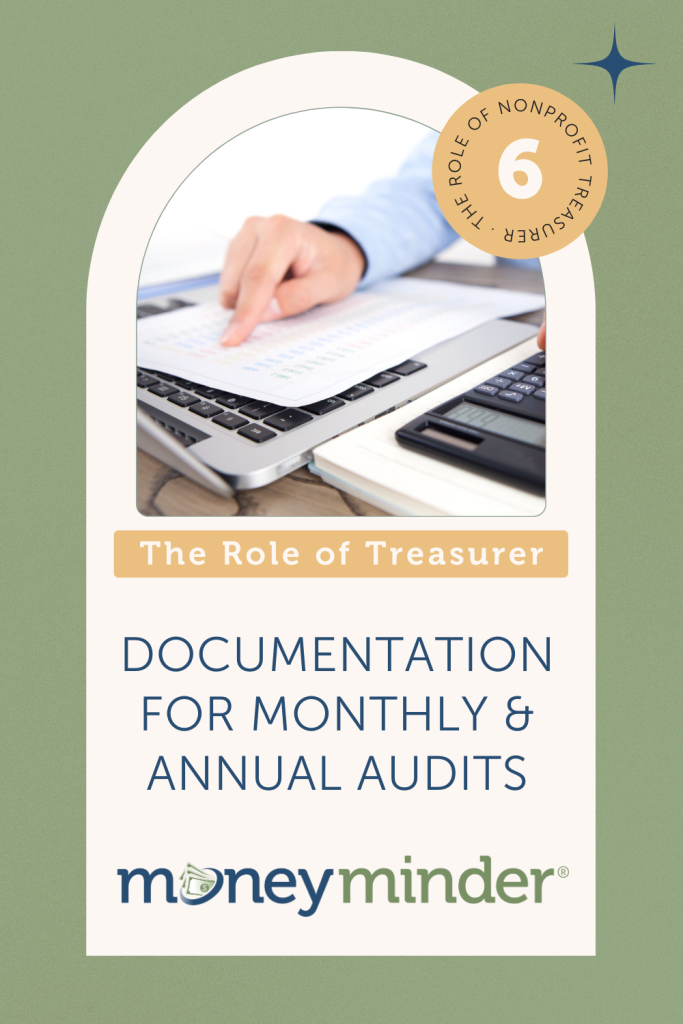This article was originally written in 2013 and was edited in 2024.
The treasurer of a nonprofit organization is usually appointed by the other members of that organization’s board. The role of treasurer is arguably one of the most important board positions in a nonprofit organization. After all, without someone carefully watching the finances and budgets, the organization has a higher chance of failing to meet its objectives.
Nonprofit treasurers might work on the payroll or be volunteers. For the purposes of this article, we will focus on volunteer treasurers of small nonprofit organizations such as Parent Teacher Associations, Booster Clubs, youth sports and charities. These groups play crucial roles in our communities, making it essential to understand the responsibilities of a board role before taking one on.
The role of the treasurer is vital to any organization. Responsibilities may differ from one organization to another, but often include the following:
A treasurer keeps all financial records and information up-to-date and secure.
As treasurer, you will maintain a permanent record to track income, receipts, and disbursements. It is your job to hold and grant access to the checkbook, debit cards, bank and payment accounts and petty cash.
Suggested tools are the treasurer’s bin, the daily operations binder, and the critical documents binder. Each of these are detailed in the Ultimate Guide to Being a Nonprofit Treasurer from MoneyMinder. The guide is available free to new MoneyMinder subscribers.
Tip: the documentation you will receive from the outgoing treasurer should give you a clear picture of what you are agreeing to be responsible for during your term in office. How organized it is will also give you an idea of whether the group has sound financial management or if you may have extra work to get things up to snuff.

A treasurer chairs the budget committee and prepares the budget for adoption.
Budgets serve as foundational pillars for the success of a nonprofit organization. Beyond mere financial planning, a budget predicts expected expenses and estimates income, making it a roadmap for fiscal responsibility.
By allocating resources for expected expenditures and incorporating a little wiggle room for unforeseen ones, a budget helps to mitigate risk. Furthermore, it provides a framework for good decision-making and helps your group maintain focus on how much it needs to raise for the activities and programs it wants to fund.
The budget must be approved by the board if there is one. It is likely that members of the board do not have financial expertise. It is the role of the treasurer to explain the budget in simple and plain terms without the use of confusing financial jargon.

A treasurer oversees the financial operations of the nonprofit.
Every nonprofit is accountable to its members, donors, funders and governing board. The organization must be able to show whether it is making a profit, breaking even, or suffering a loss. In order to do this, the organization must authorize each payment and record all transactions.
Treasurers are responsible for accurately recording all financial transactions, including income, expenses, donations and purchases—maintaining a clear audit trail for accountability. Additionally, treasurers should regularly reconcile bank statements to help identify discrepancies and ensure financial records are kept accurate and up-to-date.
TIP: Select an accounting software for small nonprofits so that you have necessary features like group accessibility, double-entry formulas, ease-of-use, built-in succession planning and cost-effectiveness.

A treasurer promotes and maintains good banking practices.
Treasurers oversee the bank account(s) and banking relationships and manage cash flow to ensure there is enough liquidity to cover expenses and fund initiatives. They handle tasks such as making deposits, reconciling accounts, and managing petty cash.
It is also the duty of the treasurer to promote good banking practices within the organization. One such practice is ensuring monies are counted by at least two members, which serves as a safeguard to prevent embezzlement.
By actively promoting and enforcing good banking practices, treasurers contribute to transparency and accountability within the organization. Cases of financial mismanagement or misconduct can not only tarnish an individual’s reputation, they can put the overall nonprofit at risk.
TIP: Read our post featuring 10 nonprofit banking rules to live by.

A treasurer reports to the board monthly and annually.
You don’t raise money just to have money. It is the role of the treasurer to give an accurate financial picture of the organization to the board monthly, in terms they will understand. In other words, how do the numbers translate into your group’s vision?
The treasurer’s report is given at the monthly board meeting and should be made monthly in both written and oral form. This report must always include an explanation for any discrepancies between the budget and current expenditure. In the event that there is a major discrepancy, it is the role of the treasurer to recommend an alternate course of action.
The treasurer should also be prepare to provide this financial report annually, at the end of the fiscal year. You can get all the details by downloading our free guide to giving the treasurer’s report.

A treasurer assembles documentation for monthly and annual audits (aka financial reviews).
All nonprofits will benefit from an audit, also known as a financial review, at the end of each financial year. For some groups affiliated with national organizations, an audit is a requirement, and the national body will have guidelines.
While the treasurer usually doesn’t sit on the audit committee per se, assembling documentation for audits and financial reviews is a crucial aspect of the treasurer role. The treasurer works closely with auditors or a financial review committee to provide documentation and answer questions. This process involves gathering and organizing financial records, including bank statements, invoices, receipts and other supporting documents.
In addition to the annual audit, we also recommend doing a 10-minute mini audit monthly, and we offer this free nonprofit audit checklist to help you get started.

What Skills Make a Good Treasurer?
Did you know that a background in accounting is not necessary to be a good treasurer? At MoneyMinder, we’ve helped many people succeed in their role as volunteer treasurers by creating an easy-to-use software that was designed just for the job at hand. Nothing more, nothing less. That said, some financial prowess will always serve you well when you are working with numbers. Here are a few other skills that will help you succeed:
- Honest and integrity
- Tenacity to get the job done
- Alignment with your group’s goals
- A knack for numbers
- Good communication skills
The role of the treasurer is a huge responsibility. Duties may vary depending on the nature of the organization. Duties may be delegated to members or volunteers; however, the responsibility is always that of the treasurer. The way in which duties are shared is dependent on the skills of the treasurer as well as how much time he has to offer.
An efficient treasurer will ensure that their organization is operated like a well-oiled machine. Records will be transparent and current, the organization will be protected from fraud and theft, and the funds generated will be well managed and invested.

This complete guide to being a treasurer is available to MoneyMinder customers free.
 Connect your Venmo account to MoneyMinder PRO to directly download transactions, saving you time and effort. You just review the transactions to ensure they are properly categorized and fill out any required fields.
Connect your Venmo account to MoneyMinder PRO to directly download transactions, saving you time and effort. You just review the transactions to ensure they are properly categorized and fill out any required fields. Connect your Bank, Square and PayPal accounts to MoneyMinder PRO to directly download transactions, saving you time and effort. You just review the transactions to ensure they are properly categorized and fill out any required fields.
Connect your Bank, Square and PayPal accounts to MoneyMinder PRO to directly download transactions, saving you time and effort. You just review the transactions to ensure they are properly categorized and fill out any required fields. Connect your Bank, Paypal and Square accounts to MoneyMinder PRO to directly download transactions, saving you time and effort. You just review the transactions to ensure they are properly categorized and fill out any required fields.
Connect your Bank, Paypal and Square accounts to MoneyMinder PRO to directly download transactions, saving you time and effort. You just review the transactions to ensure they are properly categorized and fill out any required fields. Connect your Bank, Paypal and Square accounts to MoneyMinder PRO to directly download transactions, saving you time and effort. You just review the transactions to ensure they are properly categorized and fill out any required fields.
Connect your Bank, Paypal and Square accounts to MoneyMinder PRO to directly download transactions, saving you time and effort. You just review the transactions to ensure they are properly categorized and fill out any required fields. Join It is a membership management service that helps businesses and nonprofits effectively sell, track, and grow their membership.
Join It is a membership management service that helps businesses and nonprofits effectively sell, track, and grow their membership.